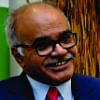
Selim Jahan
Selim Jahan is former director of the Human Development Report Office under the United Nations Development Programme and lead author of the Human Development Report.
Selim Jahan is former director of the Human Development Report Office under the United Nations Development Programme and lead author of the Human Development Report.
I do not remember who gave me the book—it may have been a friend, colleague, or a student of mine.
Development is all about enlarging freedoms for all so that every human being can pursue the choices they value and raise their voices in support of those choices.
We must realise that the US has started the tariff war with a political agenda.
In Gaza, the risk of famine is increasing due to protracted military operations. Humanitarian efforts are constrained both by inadequate relief materials and inaccessibility to the most affected areas.
Child marriage is closely linked to high adolescent pregnancy rates.
The importance of oceans in human lives can hardly be overemphasised.
The issue of joblessness should be at the centre of the growth strategy.
The philosophical focus of the upcoming budget should be pro-poor and pro-people.
In measuring human development, the role of education is clear and concrete.
Recently, the value-added tax (VAT) and supplementary duty (SD) have been increased on nearly one hundred products and services.
The “digital divide” is a way to describe the inequality in the online community.
Over the years, one of the social protection instruments that has been piloted in many countries is the universal basic income.
November 25 highlights the global issue of violence against women and its impact.
The October 30 budget was presented against the backdrop of certain predictions.
Bangladesh’s economic growth slowed down due to global uncertainties and domestic political instability and natural disasters.
Financial contributions to the UN by big and powerful developing countries like China, India, Brazil, South Africa, Nigeria and the oil-rich countries of the Middle East must increase so that the developing world has a solid voice.
Sri Lanka has recently elected Anura Kumara Dissanayaka as its new president.
Issues of fundamental human rights violations, the destruction of social justice, and unjust biases remain central to inequalities and discrimination.